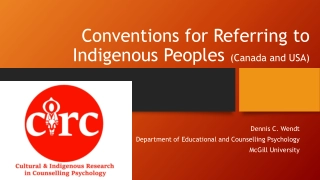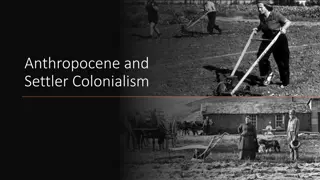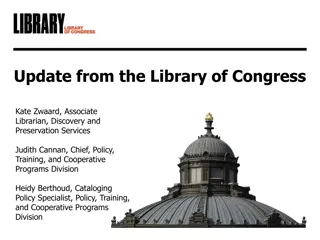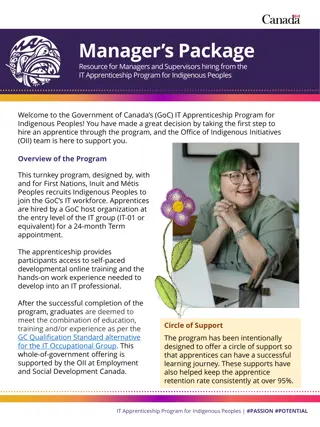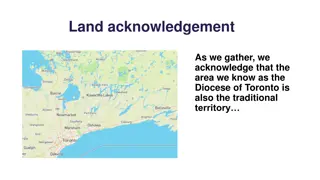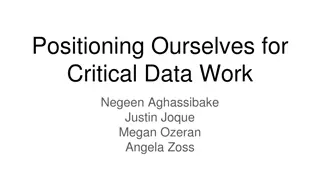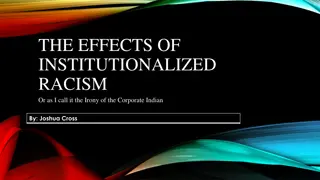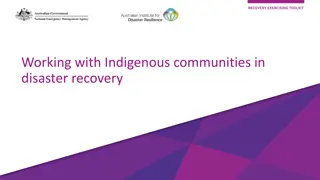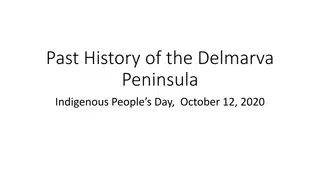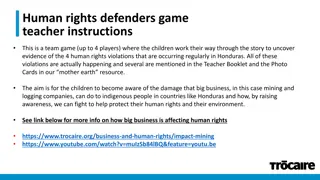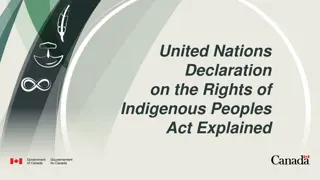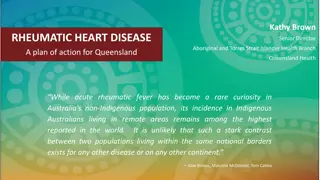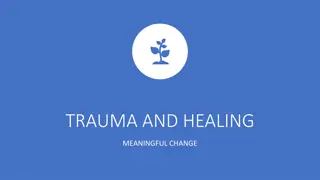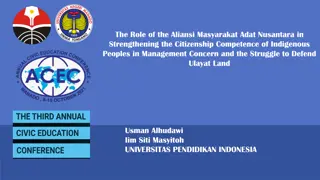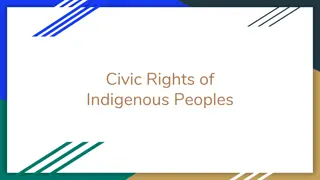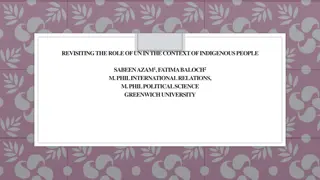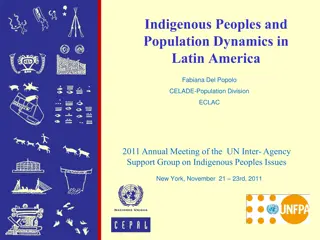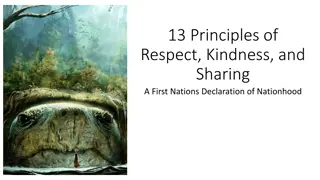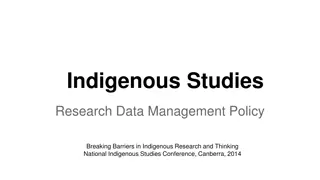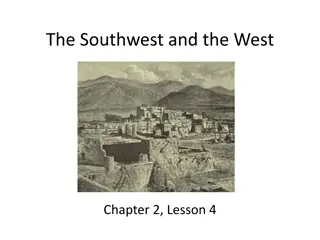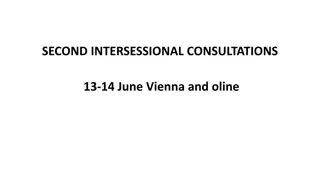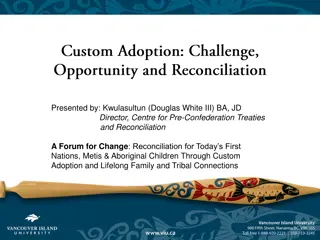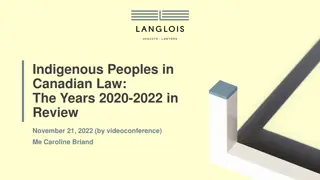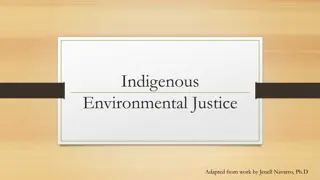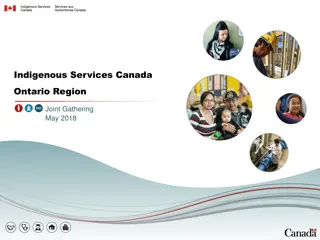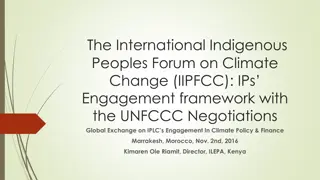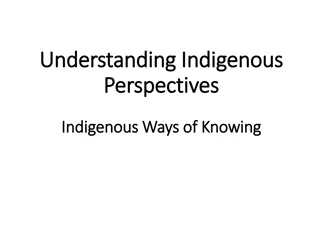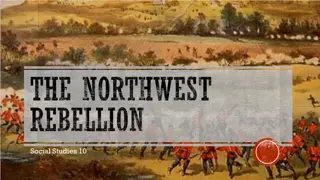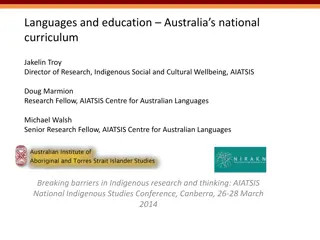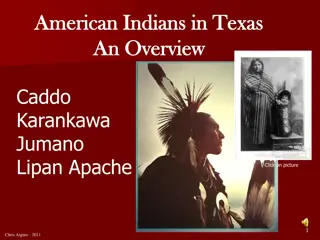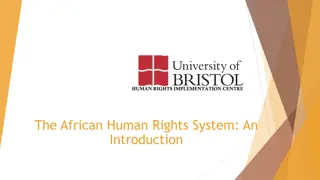Conventions for Referring to Indigenous Peoples in Canada and the USA
This article outlines guidelines for referring to Indigenous Peoples, emphasizing specificity and respect for preferred names and terms. It discusses the importance of capitalizing terms related to Indigenous Nations and cautions against using terms implying colonial possession. The use of terms lik
1 views • 24 slides
Understanding Settler Colonialism and Its Impact in the Anthropocene
Settler colonialism, a structure of domination, aims to permanently transfer settlers to Indigenous lands, leading to ongoing dispossession and conflict. This form of colonialism disrupts Indigenous nationhoods, political practices, and sovereignties. The dispossession of Indigenous bodies and lands
0 views • 8 slides
Update from the Library of Congress on Indigenous Peoples' Land Acknowledgment and Terminology Challenges
The Library of Congress recognizes the importance of acknowledging Native American land and is committed to rectifying incorrect and offensive subject headings for Indigenous peoples. Challenges in terminology and necessary changes are addressed to show respect for Native cultures.
1 views • 18 slides
Indigenous IT Apprenticeship Program Overview
The Government of Canada's IT Apprenticeship Program for Indigenous Peoples offers a comprehensive 24-month term appointment to develop Indigenous individuals into IT professionals. Supported by the Office of Indigenous Initiatives, the program provides hands-on work experience and online training,
0 views • 6 slides
Acknowledgement of Indigenous Territories in the Diocese of Toronto
The Diocese of Toronto acknowledges the traditional territories of the Anishnaabe, Haudenosaunee, and Wendat peoples, along with the Dish with One Spoon Wampum Belt Covenant. They express gratitude for Indigenous stewardship of the land, recognize historical injustices, and commit to fostering an ho
0 views • 8 slides
Understanding Human Rights in Queensland Government Work
The Human Rights Act of 2019 in Queensland outlines protected rights such as equality, freedom of expression, and fair trial. All public service employees must adhere to these rights, ensuring decisions and actions respect human rights. This act applies to everyone in the Queensland Government, with
2 views • 13 slides
Understanding Positionality and Indigenous Data Sovereignty in Critical Data Work
Explore the impact of positionality on data work, challenge notions of value-free research, and address issues of erasure and harm in Indigenous data sovereignty. Reflect on how personal values and experiences influence data understanding, and consider the rights of Indigenous peoples in owning and
5 views • 8 slides
Unveiling the Effects of Institutionalized Racism on Indigenous Peoples
Delve into the intricate web of institutionalized racism faced by Indigenous communities, exploring key concepts like covert racism versus operant racism, decolonization, and settler benefits. Learn how historical injustices, such as the Indian Act, continue to impact Indigenous autonomy and the fig
9 views • 21 slides
Understanding Indigenous Communities in Disaster Recovery
Increased understanding of intrinsic strengths and unique impacts of disasters on Indigenous communities, role of Indigenous community-controlled organizations, importance of connection to Country, and need for engagement with Indigenous communities by emergency management agencies. Disasters have u
0 views • 21 slides
Uncovering the Past: Indigenous History of the Delmarva Peninsula
Delve into the rich indigenous history of the Delmarva Peninsula, acknowledging the injustices and hardships faced by Native American communities. From Columbus' invasion to the Trail of Tears, explore the impact of colonization on indigenous peoples and the ongoing efforts to address historical mis
0 views • 15 slides
Human Rights Defenders Game: Raise Awareness of Human Rights Violations in Honduras
Engage up to 4 players in a team game to uncover evidence of human rights violations in Honduras caused by mining and logging companies. Through gameplay, children learn about the impact of big businesses on indigenous peoples and the environment, aiming to raise awareness and encourage action to pr
1 views • 6 slides
Understanding the United Nations Declaration on the Rights of Indigenous Peoples Act
The United Nations Declaration on the Rights of Indigenous Peoples Act, effective from June 21, 2021, aims to protect and promote Indigenous rights, including self-determination and equality. Key elements include the preamble emphasizing reconciliation, interpretive elements in Section 2, and the de
1 views • 13 slides
Addressing Rheumatic Heart Disease Disparities in Indigenous Australians
Rheumatic heart disease (RHD) continues to disproportionately affect Indigenous Australians, particularly those living in remote areas, with a high incidence compared to the non-Indigenous population. Acute Rheumatic Fever (ARF) is a key precursor to RHD, often linked to social determinants and poor
0 views • 7 slides
Exploring Trauma, Healing, and Indigenous Perspectives
Within this content, we delve into the profound themes of trauma, healing, and meaningful change from the perspective of Indigenous peoples. Through acknowledging elders, discussing core principles such as courage and compassion, and reflecting on the impacts of colonial oppression, a narrative of s
2 views • 33 slides
Progress of UN-REDD Programme in Asia: Indigenous Peoples Participation
The UN-REDD Programme in Asia has made strides in engaging Indigenous Peoples in various missions and consultations since 2008. The formulation process includes scoping, programming, validation, and approval stages, with key milestones reached in countries like Papua New Guinea, Indonesia, and Vietn
4 views • 6 slides
Challenges and Progress in 1920s American Civil Rights Movement
The 1920s in America saw significant changes in civil rights, women's movement, and prohibition. Civil rights encompass personal freedoms guaranteed by the U.S. Constitution, including freedom of speech, voting rights, and protection from discrimination. Violations of civil rights have occurred thro
1 views • 42 slides
Strengthening Indigenous Peoples' Citizenship Competence Through Aliansi Masyarakat Adat Nusantara
In the context of defending Ulayat land, the role of Aliansi Masyarakat Adat Nusantara (AMAN) is crucial in empowering Indonesian indigenous peoples with citizenship competence. This research explores the efforts of AMAN in enhancing indigenous community awareness, understanding, and education to st
6 views • 8 slides
Native American Voting Rights and Indigenous Governance in the United States
Native American voting rights in the United States have a complex history, with Native peoples gaining the right to vote gradually over time. Despite legal allowances, barriers such as nontraditional addresses, voter registration obstacles, and ID laws still hinder their voting participation. The Na
2 views • 11 slides
Evolution of Human Rights: From Ancient Times to Modern Era
Throughout history, ideas of rights and liberty have evolved, leading to the recognition of universal human rights in the modern sense. The concept of human rights can be traced back to significant historical events such as the English Bill of Rights, the Virginia Declaration of 1776, and the French
0 views • 7 slides
Human Rights and Citizenship Rights in Leisure, Sport, and Tourism: A Historical Perspective
This text delves into the intersection of human rights, citizenship rights, and leisure activities like sports and tourism. It explores the definitions, history, and declarations related to human rights, emphasizing the importance of allowing individuals the freedom to pursue leisure activities with
0 views • 20 slides
Overview of International Human Rights Law and Treaties
This comprehensive overview delves into the foundations of international human rights law, exploring key documents such as the Universal Declaration of Human Rights, the International Bill of Rights, and various human rights treaties addressing discrimination, women's rights, children's rights, migr
0 views • 27 slides
Settler Colonialism and Carcerality: Disrupting Indigenous Relationships and Territories
This study delves into the impact of settler colonialism on Indigenous peoples, focusing on the immobilization and movement imposed on them through carceral spaces. It explores the intersections of official and unofficial carceral spaces, shedding light on the disrupting effects on Indigenous relati
0 views • 8 slides
The Role of UN in Indigenous Peoples: A Critical Analysis
The research delves into the role of the United Nations in addressing the unique social, cultural, economic, and political qualities of indigenous peoples worldwide. It discusses the importance of recognizing indigenous rights, traditions, and the challenges they face in contemporary societies, emph
0 views • 7 slides
Indigenous Peoples and Population Dynamics in Latin America
Latin America is a region with diverse indigenous groups, facing demands for recognition and rights. The importance of information, especially from censuses, is crucial for developing policies and programs to support indigenous peoples. Various data sources such as censuses, surveys, and registries
0 views • 19 slides
Principles of Respect, Kindness, and Sharing: A First Nations Declaration
In this declaration, the author emphasizes the responsibility of First Nations as caretakers of their ancestral lands. It discusses the historical exclusion of First Peoples in the formation of Canada and calls for the recognition and preservation of Indigenous rights and sovereignty. The text highl
0 views • 16 slides
Indigenous Studies Research Data Management Policy: Breaking Barriers in Indigenous Research
Covering cultural rights, Indigenous data custodianship, policy developments, and ATSILIRN protocols, this presentation at the National Indigenous Studies Conference in 2014 highlights key issues and approaches in managing research data in Indigenous studies.
0 views • 61 slides
Indigenous Peoples of the Southwest and West: Adapting to Environment and Trade Networks
Indigenous peoples of the Southwest and West, such as the Pueblo, Navajo, Shoshone, Nez Perce, and Chumash, adapted to their environments by building adobe homes, utilizing trade networks for resources, and honoring their beliefs through ceremonial practices. They thrived by growing staple foods, hu
0 views • 6 slides
Role of Civil Society and Indigenous Peoples in Countering Cybercrime
Civil society and indigenous peoples play a crucial role in the implementation of the International Convention on Countering the Use of Information and Communications Technologies for Criminal Purposes at national levels. Cybercrime encompasses various activities, ranging from fraud and identity the
0 views • 15 slides
Addressing Intergenerational Crisis Through Custom Adoption and Legal Recognition
The presentation emphasizes the importance of recognizing ancestral laws and customs of Aboriginal peoples in addressing the intergenerational crisis faced by First Nations, Métis, and Aboriginal children. It explores the history of custom adoption, Indigenous traditions, and legal provisions. Focu
0 views • 28 slides
Overview of the African Commission on Human and Peoples' Rights
The African Commission on Human and Peoples' Rights was established to promote and protect human rights across Africa. The African Charter, which entered into force in 1986, emphasizes civil and political rights, including freedom from discrimination, equality, life, personal integrity, and various
0 views • 27 slides
Indigenous Rights Litigation in Canadian Law: A Review of 2020-2022
Strategic considerations in Indigenous rights litigation, social acceptability in decision-making, Indigenous identities, and future expectations were discussed in a review from November 21, 2022. The case of Southwind v. Canada highlighted issues of fiduciary obligations and equitable compensation
0 views • 50 slides
Understanding Indigenous Environmental Justice & Biodiversity Interconnection
Exploring the intricate relationship between Indigenous environmental justice, biodiversity, and cultural diversity as discussed by Jenell Navarro, Ph.D., and Winona LaDuke. The impact of settler colonialism, capitalism, and loss of Indigenous populations on environmental degradation is highlighted.
0 views • 9 slides
Indigenous Services Canada Achievements and Initiatives Overview
Indigenous Services Canada in Ontario region held a joint gathering in May 2018, leading to the formation of a new department focusing on improving health outcomes for Indigenous communities. The department has made significant strides in enhancing services such as healthy child development, mental
0 views • 25 slides
International Indigenous Peoples Forum on Climate Change (IIPFCC) Engagement Framework
The IIPFCC is a platform where indigenous peoples globally come together during UNFCCC negotiations to voice their concerns and shape outcomes. The forum provides a safe space for consensus-building on shared issues. Co-chaired by representatives from different regional groupings, the IIPFCC operate
0 views • 14 slides
Exploring Indigenous Knowledge in Education
Delve into Indigenous ways of knowing, understanding, and learning, emphasizing the importance of integrating traditional Indigenous pedagogies in education. Learn about the characteristics, sources, and values of Indigenous knowledge, and explore the intersection of Indigenous knowledge with Wester
0 views • 46 slides
The Northwest Rebellion and Its Impact on Metis and Plains Peoples
The Northwest Rebellion in Canada during the late 19th century saw significant challenges faced by the Metis and Plains Peoples. The Metis struggled with broken promises of land, sparking anger and a call for ownership rights. In contrast, the Plains Peoples faced starvation as they became reliant o
0 views • 14 slides
Preserving Australian Indigenous Languages in Education
The development of the Framework for Aboriginal Languages and Torres Strait Islander Languages in the Australian Curriculum aims to give equal representation to Australian languages alongside other world languages in schools. This initiative helps preserve, document, and maintain indigenous language
0 views • 28 slides
Australians Reject Indigenous Advisory Panel: Impact & Challenges
Australians recently voted against establishing an Indigenous advisory panel, highlighting inequities faced by Indigenous Australians. The referendum faced misinformation and lacked clarity on its benefits. The rejection raises questions on addressing Indigenous issues, impacting Australia's global
1 views • 5 slides
Indigenous Peoples of Texas: Caddo and Karankawa Tribes Overview
Explore the rich history of the Caddo and Karankawa tribes in Texas. Learn about their way of life, including housing, food sources, and hunting practices. Discover how these indigenous peoples shaped the region.
0 views • 17 slides
Overview of the African Human Rights System
The African Human Rights System encompasses various key elements such as the Organisation of African Unity, African Charter on Human and Peoples' Rights, African Court on Human and Peoples' Rights, African Union, and additional human rights-related treaties and protocols. This system aims to protect
0 views • 19 slides
